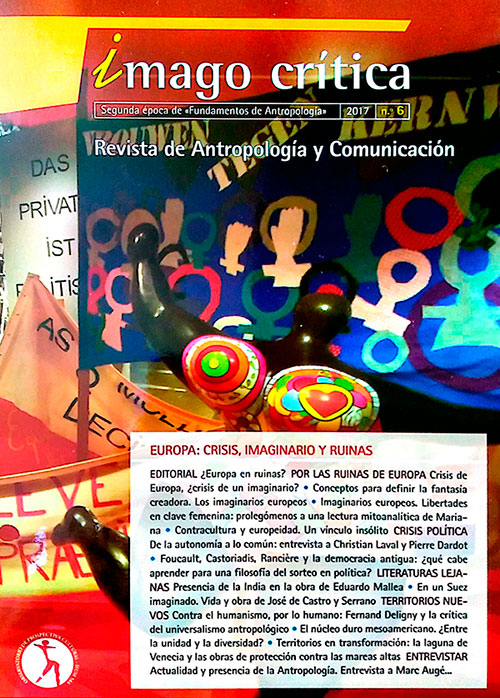Concepts to define the creative fantasy The European lmaginaries
DOI:
https://doi.org/10.30827/ic.28494Keywords:
Phantasy, Imagination, Imaginary, Mundus imaginalis, Plato, Kant, Gaston Bachelard, Gilbert Durand, Henry CorbinAbstract
This study aims to delimit three concepts used to define the creative fantasy: imagination, imaginary and imaginal. While the former belongs to the common language and forms part of a long philosophical tradition, the latter two have been coined by the twentieth century philosophers, constituted in what may be called the school of "studies of the imaginary". To briefly explain it, imagination designates fantasy as a combinatorial faculty of preexisting images in the psyche. Classical philosophers have generally treated it as the "source of all errors" and the "madwoman of the house ". The imaginary is fantasy in its creative and exploratory aspect (Kant's "transcendental imagination"), as Romantic thinkers, psychoanalysts and contemporary philosophers (Bachelard, Durand, etc.) have successively defined. The imaginal or "mundus imaginalis "is a concept forged by Henry Corbin, from Arab Neoplatonism, to designate ontological fantasies, endowed with a metaphysical reality. I propose to reuse this third concept to define the imagosphere or the Iconsphere constituted by the contemporary digital and digital world.
References
ARAÚJO, Alberto Filipe y BAPTISTA, Fernando Paulo (eds.), Variaçoes sobre o imaginário. Domínios, teorizaçoes, práticas hermenéuticas, Lisboa, Instituto Piaget, 2003.
BACHELARGD, Gaston, La psychanalyse du feu, París, Gallimard, 1938.
-L'eau et les réves, París, José Corti, 1942.
-L'air et les songes, París, José Corti, 1943.
-La terre et les réveries de la volonté, París, José Corti, 1948.
BACON, Francis, Novum organum, introducción, traducción y notas de Michel Malherbe y Jean-Marie Pousseur, París, PUF, 1986.
BACZKO, Bronislaw, Les imaginaires sociaux, París, Payot 1984.
BEGULN, Albert, L'áme romantique et le réve, París, Corti, 1939.
BLAGA, Lucian, Opere (Oeuvres) , Bucarest, Minerva, vol. 7, 1980, vol. 8, 1983, vol. 9, 1985, vol. 10, 1987, vol. 11, 1988.
BOIA, Lucian, Pour une histoire de l'imaginaire, París, Les Belles Lettres, 1998.
CAILLOIRS, Roger, Approches de l'imaginaire, París, Gallimard, 1974.
CASSIRER, Ernst, La philosophie des formes symboliques. 3. La phénoménologie de la connaissance, traducción e índice de Claude Fronty, París, Les Editions de Minuit, 1972.
CORBIN, Henry, L'imagination créatrice dans le soufisme d'Ibn Arabi, París, Flammarion, 1958.
COULIANO, Ioan Petru, Eros et magie a la Renaissance. 1484, París, Flammarion, 1984.
- The Tree of Gnosis. Gnostic Mythology from Early Christianity to Modern Nihilism, Nueva York, Harper Collins, 1992.
DAMÁSIO, António, Descartes' Error. Emotion, Reason, and the Human Brain, Londres, A Grosset/Putnam Book, 1996.
DESCARTES, René, Regles utiles et claires pour la direction de l'esprit en la recherche de la vérité, traducción según el léxico cartesiano y anotación conceptual por Jean-Luc Marion, con notas mathemáticas de Pierre Costabel, La Haya, Martinus Nijhoff, 1977.
DUBOIS, Claude-Gilbert, L'imaginaire de la Renaissance, París, Presses Universitaires de France, 1985.
DURAND, Gilbert, Les structures anthropologiques de l'imaginaire, París-Bruselas-Montreal, Bordas, 1969.
- lntroduction a la mythodologie. Mythes et sociétés, París, Albin Michel, 1996.
DURAND, Yves, Une technique d'étude de l'imaginaire, París, I;Harmattan, 2005.
ELIADE, Mircea, Traité d'histoire des religions, París, Payot, 1964.
ISER, Wolfgang, The Fictive and the lmaginary, Baltimore y Londres, The Johns Hopkins University Press, 1993.
JUNG, Carl Gustav, The Archetypes and the Collective Unconscious, Princeton, Princeton University Press, 1969.
KEARNEY, Richard, The Wake of lmagination, Londres, Routledge, 1988.
-Poetics of lmagining. Modem to post-modern, Edimburgo, Edinburgh University Press, 1998.
RICOEUR, Paul, La métaphore vive, París, Seuil, 1975.
ROJAS MIX, Miguel, El imaginario. Civilización y cultura del siglo XXI, Buenos Aires, Prometeos Libros, 2006.
SARTRE, Jean-Paul, L`'imaginaire. Psychologie phénoménologique del'imagination, París, Gallimard, 1940.
-L'etre et le néant. Essai d'ontologie phénoménologique, París, Gallimard, 1943.
SPINOZA, Baruch, Traité de la Réforme de l'Entendement, establecimiento del texto, traducción, introducción y comentarios de Bernard Rousset, París, Librairie philosophique J. Vrin, 1992.
TAYLOR, Charles, Modern Social lmaginaries, Durham y Londres, Duke University Press, 2004.
THOMAS, Joel (éd.), lntroduction aux méthodologies de l'imaginaire, París, Ellipses, 1998.
VEDRINE, H., Les grandes conceptions de l'imaginaire, París, Gallimard, 1990.
WUNENBURGER, Jean-Jacques, Philosophie des images, París, Presses Universitaires de France, 1997.
-La vie des images, Grenoble, Presses Universitaires de Grenoble, 2002.
-L'imaginaire, París, Presses Universitaires de France, 2003.
Downloads
Published
Issue
Section
License
Copyright (c) 2017 Imago crítica. Revista de Antropología, Comunicación y Estudios Culturales

This work is licensed under a Creative Commons Attribution-NonCommercial-ShareAlike 4.0 International License.












